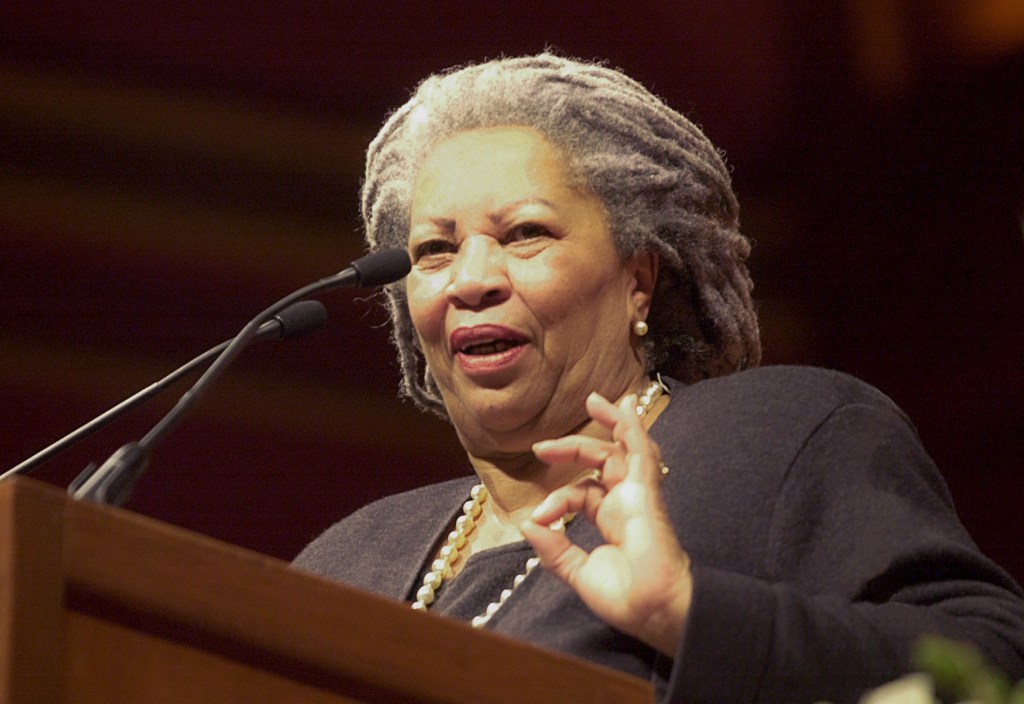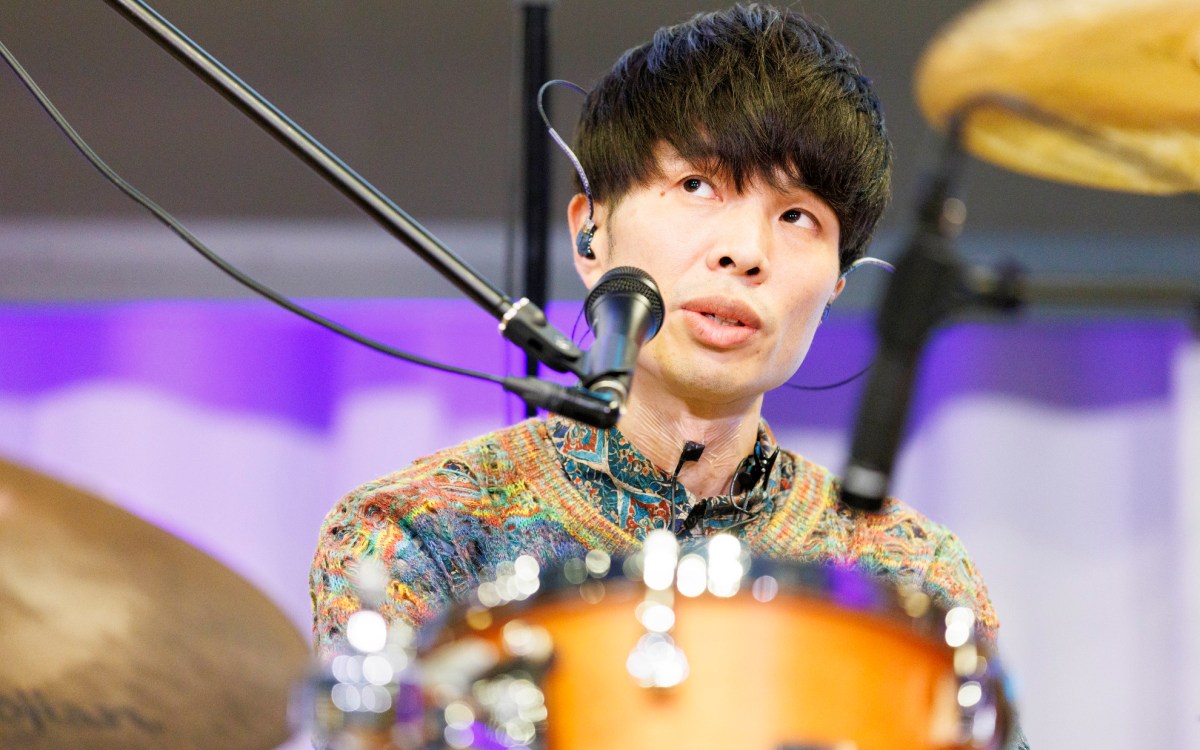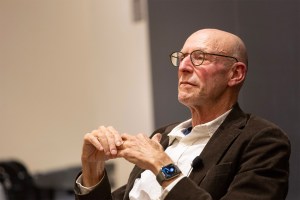Campus & Community
-

Tracing Harvard’s ties to slavery: Recovering names and histories
Researchers delve into probate records, tax lists, and estate inventories to identify enslaved people
-

Ballot order set for Overseer and HAA director elections
Candidates finalized ahead of spring voting period
-

Kicking back with Rose Byrne
Australian actress feted, roasted as Hasty Pudding Woman of the Year
-

What’s the greatest love song of all time?
Faculty and administrators tell you theirs
-

Of different faiths, but connected by belief
Community members gather to explore identity, spiritual experience at first ‘Across This Table’ interfaith dinner
-

Batman returns — to accept his Pudding Pot
Michael Keaton feted as Hasty Pudding’s Man of the Year, 30 years after first invite
-
Harvard calls on former Secretary of Treasury
Robert E. Rubin will be the principal speaker at the Afternoon Exercises of Harvards 350th Commencement on Thursday, June 7.
-
Morrison talks race and gender
Relationships between black and white women in literature have provided a sometimes painful mirror of racial stereotypes in the real world, Nobel Prize-winning author Toni Morrison said Tuesday, concluding, however, that literature today has gotten beyond stereotypes, no longer mirroring reality but running ahead of it.

-
John E. Dowling receives Gund Award
John E. Dowling, the Maria Moors Cabot Professor of Natural Sciences at Harvard University, was recently awarded the prestigious Llura Liggett Gund Award from The Foundation Fighting Blindness.
-
In Brief
Veritas Forum returns to Harvard After a two-year hiatus, the Veritas Forum returned to Harvard yesterday (Wednesday, April 4), and will run through Monday, April 9. Through lectures, panels, and…
-
Chemistry and Chemical Biology fellowships awarded
Each year, the Department of Chemistry and Chemical Biology receives a number of corporate fellowships instrumental in the training of graduate students in organic chemistry. The 2000-01 research fellowships are sponsored by Eli Lilly Research Laboratories, Hoffmann-La Roche Inc., and Bristol-Myers Squibb Pharmaceutical Research. Ten graduate students have been awarded the fellowships this year.
-
Eleven affiliates win Soros Fellowship for New Americans
Eleven Harvard University students and graduates are among the 30 recipients for the 2001 Paul and Daisy Soros New American Fellowship. Fellows receive up to a $20,000 stipend plus half tuition for as many as two years of graduate study at any institution of higher learning in the U.S.
-
Shedding light on science
There were cockroaches perched on little kids fingers, cockroaches cupped in kids hands, cockroaches crawling on the table – and 9-year-old faces screwed up in an odd mixture of excitement, disgust, and delight.
-
A very good year
After last months 3-1 loss against Ivy rival Dartmouth in the ECAC Championship game, and a 6-3 upset in the first ever NCAA Womens Championship Semifinal in Minneapolis versus the eventual national champion Minnesota-Duluth Bulldogs, this seasons brilliant Crimson squad found its post-season solace wherever it could, and not surprisingly, in a number of ways.
-
Fineberg to conclude service as provost
Harvey V. Fineberg has announced his intention to conclude his service as the Universitys provost, effective June 30.
-
In brief
President holds office hours President Neil L. Rudenstine will hold office hours for students in his Massachusetts Hall office from 4 to 5 p.m. on April 4. Provost Harvey V.…
-
Martel, 82, purchasing department employee
Leverett A. Martel, who worked for 20 years in the purchasing department at the University, died on Friday, March 9, in Rockport, Mass. He was 82. Martel was employed at…
-
NewsMakers
Botterill named Ivy player of the year Harvard University women’s hockey forward Jennifer Botterill ’02, was unanimously named the Ivy League Women’s Hockey Player of the Year. Botterill finished the…
-
Police reports
Following are some of the incidents reported to the Harvard University Police Department (HUPD) for the week ending March 17. The official log is located at Police Headquarters, 29 Garden…
-
Once upon an epoch …
Dan Schrag tells a good story.
-
Music on the brain
Babies come into the world with musical preferences. They begin to respond to music while still in the womb. At the age of 4 months, dissonant notes at the end of a melody will cause them to squirm and turn away. If they like a tune, they may coo.
-
Steve Livernash: Projectionist
His first professional job took him into Bostons Combat Zone.
-
Kamarck follows the campaign trail back to Harvard
Elaine Kamarck, senior policy adviser to the Gore 2000 campaign, returned to Harvards Kennedy School of Government (KSG) as faculty-in-residence at the Center for Business and Government (CBG). As a White House insider, Kamarck will share her experience in the classroom and bring that insight to her research at the Center.
-
Intersection of race and architecture
Darell Fields does not see in black and white, but in “blackness.” The term, according to the associate professor of architecture at the Graduate School of Design (GSD), refers not…
-
Mark Roe is appointed professor of law
Mark J. Roe, a Columbia Law School professor and current visiting professor at Harvard Law School, has been named professor of law at Harvard – a tenured appointment. A 1975 Harvard Law graduate, Roe has written extensively on corporate law and new methods of corporate reorganization and bankruptcy. At Harvard, he has taught corporate finance and reorganization, as well as a seminar on advanced issues in corporate law.
-
Some don’t like it hot
While politicians argue, polar bears slowly starve.
-
Sosland gift invigorates drive for fellowships and professorships
Elaine Kamarck, senior policy adviser to the Gore 2000 campaign, returned to Harvards Kennedy School of Government (KSG) as faculty-in-residence at the Center for Business and Government (CBG). As a White House insider, Kamarck will share her experience in the classroom and bring that insight to her research at the Center.
-
Stewart shares her secrets
Home style maven Martha Stewart touted the “power of a single idea” at Sanders Theatre last week and told students that anyone can head their own company if they set…
-
High schoolers meet the press
The mayor was vacillating. The police were posturing. The ACLU was pontificating. And hip-hop star Big X, having been stopped by police for a tilted license plate and detained for three hours, said his actual crime was DWB – driving while black. It was a press conference from the front lines of the urban American battlefield, and it was acted out on the stage of the Littauer Penthouse at the Kennedy School by Dorchester high school students.
-
Karl Strauch: Memorial Minute
His warm and enthusiastic teaching style endeared him to generations of undergraduates, and he firmly guided over twenty graduate students as they began their physics careers.
-
Figuring it out
During some of the nastier months of a New England winter, junior Amy Chang – the director and instructor of Harvards recreational ice skating classes – leads a group metamorphosis in the quiet confines of the Bright Hockey Center. From early February through March, this veteran skater of nearly 10 years eases novice students into a comfortable and confident place on the ice, while fostering the balletlike precision and speed of the more seasoned skaters. Not only are the classes varied in their level of skill – they also include a diverse crowd ranging from freshmen to staff. I like that its not just undergraduates, Chang says.
-
After-school programs provide guiding hand
Back in the mid-20th century, kids came streaming out of school at 3 p.m. into the gloriously unstructured portion of their day, the part between sitting upright at their desks and sitting upright at the dinner table. It was a time for stickball, tag, ringalevio, for riding a bike, strapping on roller skates, or earning pocket money at a part-time job. It was a time that kids everywhere looked forward to, and somehow instinctively knew how to use to their best advantage.
-
This month in Harvard history
March 21, 1953 – Responding to the death of Soviet dictator Joseph Stalin, educational radio station WGBH-FM broadcasts two and a half hours of taped reflections from 12 Harvard professors…
-
A letter from Provost Fineberg
Dear Colleagues and Friends, I am writing to let you know that I will be concluding my service as Provost as of June 30, 2001. Serving in this role these…
-
Daniels joins KSG as director
Helaine Daniels, formerly of the U.S. Agency for International Development (USAID), Oxfam, Mobil Oil Africa, and the Boston Globe, has been named director of international student programs at the Kennedy School of Government (KSG), Associate Dean Joseph McCarthy announced.
-
If this desk could talk …
It doesnt have a pull-out keyboard drawer, full-extension hanging files, or a built-in surge protector, but theres probably no other desk like it in all of Harvard.


